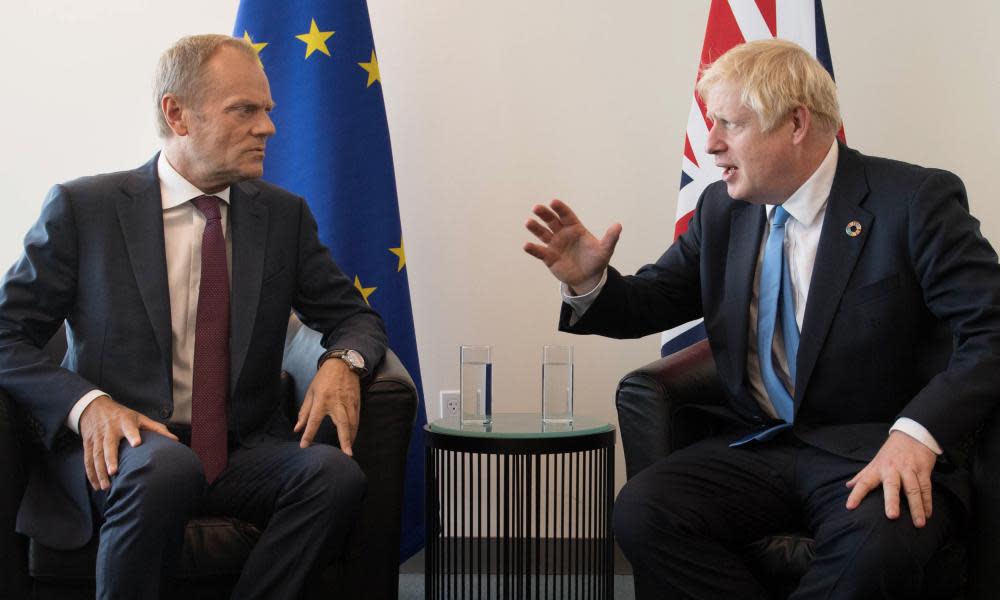Johnson hints at major reforms to tax and industry post-Brexit

Boris Johnson has signalled his hope to push down tax rates and diverge from EU standards and regulations after Brexit, even as his talks on a new departure plan at a UN summit in New York met with seemingly limited success.
The prime minister was expected to try to sell his self-styled replacement for the Irish backstop border insurance policy during two days of meetings with leaders from the EU and member states.
On Monday he held talks with Emmanuel Macron of France and Germany’s Angela Merkel, as well as Donald Tusk, the European council president, and Charles Michel, the Belgian prime minister.
After the 30-minute discussion, an EU spokesperson said there were “still big gaps in substance”.
“If there is to be a deal, there is little time left although no formal deadline,” the spokesperson said. “The EU will need realistic, operational proposals in legal form. The UK non-papers do not meet the objectives of the backstop.”
A UK government official said Johnson had made it clear Northern Ireland staying in some sort of backstop on its own was “not a solution that the UK government could accept”.
Tusk tweeted following the meeting: “No breakdown. No breakthrough. No time to lose.”
In another setback, while Johnson used a TV interview to call on the Republic of Ireland to potentially compromise over the border issue, the taoiseach, Leo Varadkar, whom Johnson was due to meet on Tuesday, poured cold water on the idea.
After talks at the UN general assembly with Tusk, Varadkar said Ireland would not accept a “halfway house” plan for the border.
“There are also some people that believe at the last minute that Ireland will somehow fold or give up our position and that’s not going to happen,” he said.
After the pair’s 45-minute meeting, Varadkar’s spokesman said he and Tusk agreed that the EU had still not seen any viable UK solutions to the Irish border and that “time is very short” if there was to be a deal by next month’s European council summit.
Speaking earlier, Michel Barnier, the EU’s chief negotiator, described Johnson’s solution for replacing the backstop as unacceptable, giving his most downbeat assessment yet of the chances of striking a Brexit deal by 31 October.
Standing alongside the German foreign minister, Heiko Maas, following a meeting in Berlin, Barnier said the UK wanted a “regulatory and customs land border on the island of Ireland” and thus for the EU to change how the single market operated.
“As I am sure you will understand, this is unacceptable,” he said. “My mandate is clear of the 27 leaders, the EU and the European parliament, safeguarding peace and stability in Ireland and protecting the integrity of the single market.”
In what Downing Street has billed as Johnson’s setpiece Brexit speech in New York, on Tuesday morning he is to address US and Canadian businesspeople in the city’s plush and newly built Hudson Yards district.
According to extracts of the speech released in advance, Johnson will promise that a post-Brexit UK would “roll out the red carpet” for US businesses, with “the most competitive tax rates and the best skilled workforce in the hemisphere”.
“As we come out of the EU we are going up a gear,” he is due to say. “We are going to take advantage of all the freedoms that Brexit can give, whether that is new tax allowances for investment or speeding up public procurement contracts.”
In a round of TV interviews in New York, Johnson said examples where the UK could diverge from EU regulations in the future could be financial services or biotechnology, “where we want to do things different”.
He told Channel 4 News: “To give you another example, it may be that we want, for instance, to take advantage of tax freedoms to allow companies to invest more in capital and plant. We may want to do free ports in the UK to drive up economic growth in areas that have fallen behind.”
The EU has insisted it will not sign up to a deal that creates a regulatory and customs border on the island of Ireland, as proposed by the UK in the papers tabled last week by the government’s chief negotiator, David Frost.
Asked by Channel 4 if Ireland could help the impasse by, for example, accepting some UK regulations, Johnson called for movement on all sides.
“What I think is certainly a good thing is if everybody comes together to try to sort this out,” he said. “I think there’s an opportunity for us to get an agreement that really looks after the critical interests of everybody including Ireland.”
Talking to Sky News, Johnson argued that the UK proposal for a common Irish regulatory area for sanitary and phytosanitary products – mainly agriculture and food – was a major shift by London.
“I think possibly what’s becoming clear to people is that the UK has actually made a big offer when it comes to the unity of the sanitary and phytosanitary zone for the whole of Ireland. That’s a big concession by us, it’s an imaginative move,” he said.

 Yahoo News
Yahoo News 
